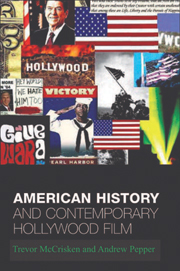Book contents
- Frontmatter
- Contents
- Acknowledgements
- Preface
- Introduction
- 1 Lessons from Hollywood's American Revolution
- 2 Rattling the chains of history: Steven Spielberg's Amistad and ‘telling everyone's story’
- 3 Hollywood's Civil War dilemma: to imagine or unravel the nation?
- 4 Saving the Good War: Hollywood and World War II in the post-Cold War world
- 5 Oliver Stone and the decade of trauma
- 6 From Civil Rights to Black Nationalism: Hollywood v. black America?
- 7 Hollywood's post-Cold War history: the ‘righteousness’ of American interventionism
- Select Bibliography
- Index
3 - Hollywood's Civil War dilemma: to imagine or unravel the nation?
Published online by Cambridge University Press: 05 August 2013
- Frontmatter
- Contents
- Acknowledgements
- Preface
- Introduction
- 1 Lessons from Hollywood's American Revolution
- 2 Rattling the chains of history: Steven Spielberg's Amistad and ‘telling everyone's story’
- 3 Hollywood's Civil War dilemma: to imagine or unravel the nation?
- 4 Saving the Good War: Hollywood and World War II in the post-Cold War world
- 5 Oliver Stone and the decade of trauma
- 6 From Civil Rights to Black Nationalism: Hollywood v. black America?
- 7 Hollywood's post-Cold War history: the ‘righteousness’ of American interventionism
- Select Bibliography
- Index
Summary
The unpopularity of slavery as a subject for Hollywood is underlined by the significantly larger proportion of films made about the American Civil War. The Civil War has traditionally occupied a hallowed place in the benign meta-narrative of American history, one in which the bloody divisions between North and South are incorporated into a larger story of nation in which the sacrifice, suffering and bravery of both sides are equally celebrated. As such, Hollywood, one of the key ‘players’ in shaping the nature and ideological content of American public history, has played an important role in transforming the Civil War, to use David Thelen's words, from a ‘story of bitter, irreconcilable conflict between two societies and between two sets of values’ into one of ‘human courage and bravery exhibited by all’. This chapter focuses on the ways in which a range of post-Cold War films about the Civil War – Glory (1989), Gettsyburg (1993), Ride with the Devil (1999) and Cold Mountain (2003) – have engaged with this benign meta-narrative; that is, whether or to what extent they have challenged or reinforced an affirmative notion of national identity and how their engagement with such concerns speaks about the numerous, complex ways in which ‘America’ is being re-constituted domestically and internationally in the post-Cold War world.
- Type
- Chapter
- Information
- American History and Contemporary Hollywood Film , pp. 64 - 88Publisher: Edinburgh University PressPrint publication year: 2005



